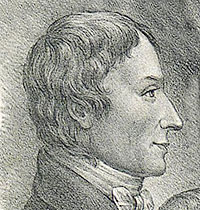| Anders Gustaf Ekeberg | |
|---|---|
 | |
| Born | 16 January 1767 Stockholm, Sweden |
| Died | 11 February 1813 (1813-02-12) (aged 46) Uppsala, Sweden, |
| Known for | tantalum |
Anders Gustaf Ekeberg (16 January 1767 in Stockholm, Sweden – 11 February 1813 in Uppsala, Sweden) was a Swedish analytical chemist who discovered tantalum in 1802. He was notably deaf.
Education
Anders Gustav Ekeberg was a Swedish scientist, mathematician and expert in Greek literature. His father, Joseph Erik Ekeberg, was a shipbuilder. His uncle was Carl Gustaf Ekeberg.
Anders Gustav Ekeberg attended school at Kalmar, Söderåkra, Vestervik, and Karlskrona. He was a gifted student and enrolled at Uppsala University in 1784, graduating in 1788. His thesis addressed the extraction of oils from seeds. In 1789 and 1790, he traveled and studied in Germany, hearing Martin Heinrich Klaproth lecture in Berlin as well as Christian Ehrenfried Weigel in Greifswald.
Career
In 1794, Anders Gustav Ekeberg began teaching at Uppsala. He was a supporter of Antoine Lavoisier's proposals for systematizing chemical nomenclature. In 1795 he and Pehr von Afzelius published the first article to introduce the modern names for chemical elements such as hydrogen, nitrogen, and oxygen into the Swedish language, "On the Present State of Chemical Sciences".
He was made docent in chemistry in 1794 and experimentator (laborator) in 1799, working as a demonstrator in the laboratory of Torbern Bergman. In 1798 he lectured on the theory of combustion. In 1799, he was elected a member of the Royal Swedish Academy of Sciences.
Ekeberg had poor health throughout his life. During his childhood a severe cold had impaired his hearing, which was further weakened over the years, so that it hindered his teaching activities. Subsequently, a gas explosion blinded him in one eye.
Ekeberg was portrayed by his friends and students as a kind and gentle man. He died, unmarried, at the age of 46.
Research


Ekeberg analyzed a number of the minerals found at Ytterby and Falun. In 1802 he analyzed specimens of tantalite from Kimito, Finland, and of yttrotantalite from Ytterby, Sweden. He is credited with finding the element tantalum in both.
Ekeberg named the new element after the mythical Ancient Greek demigod Tantalus. According to legend, he was condemned to eternal frustration when he had to stand in water up to his neck, but the water receded as he attempted to drink.
The Anders Gustaf Ekeberg Tantalum Prize
In 2018 the Tantalum-Niobium International Study Center established The Anders Gustaf Ekeberg Tantalum Prize ("Ekeberg Prize"), an annual award to recognize excellence in tantalum research. The Prize will increase awareness of the many unique properties of tantalum products and the applications in which they excel. The inaugural winner of the Ekeberg Prize was Yuri Freeman, for his book "Tantalum and Niobium-Based Capacitors" (Springer, 2018).
References
- ^ Weeks, Mary Elvira (1956). The discovery of the elements (6th ed.). Easton, PA: Journal of Chemical Education.
- Marshall, James L.; Marshall, Virginia R. (2013). "Rediscovery of the Elements: Columbium and Tantalum" (PDF). The Hexagon: 20–25. Retrieved 30 December 2019.
- Weeks, Mary Elvira (1932). "The Discovery of the Elements: VII. Columbium, Tantalum, and Vanadium". Journal of Chemical Education. 9 (5): 863–884. Bibcode:1932JChEd...9..863W. doi:10.1021/ed009p863. - subscription required
- Academie-Adjuncten och Chemie-Labratorn i Upsala (1812). "Mag. And. Gust. Ekebergs Biographie". Kungliga Svenska Vetenskapsakademiens Handlingar (in Swedish). 23: 276–280.
- Lang, Harry G. (June 2002). "Book Review". Isis. 93 (2): 356–357. doi:10.1086/345053. JSTOR 10.1086/345053.
- ^ Lundgren, Anders (1988). "The New Chemistry in Sweden: The Debate That Wasn't". Osiris. 4 The Chemical Revolution: Essays in Reinterpretation: 146–168. doi:10.1086/368676. S2CID 145384414.
- Debus, Allen G. (1968). World Who's who in Science: A Biographical Dictionary of Notable Scientists from Antiquity to the Present. Marquis-Who's Who. p. 516.
- Jorpes, J. Erik (1966) Jac. Berzelius – his life and work; translated from the Swedish manuscript by Barbara Steele. Stockholm: Almqvist & Wiksell, 1966. (Reissued by University of California Press, Berkeley, 1970 ISBN 0-520-01628-9)
- Lang, Harry G.; Meath-Lang, Bonnie (1995). Deaf Persons in the Arts and Sciences: A Biographical Dictionary. Rochester Institute of Technology. pp. 112–114. ISBN 9780313291708. Retrieved 7 December 2019.
- "Early history". Tantalum-Niobium International Study Center (T.I.C.). Retrieved 7 December 2019.
- "The Anders Gustaf Ekeberg Tantalum Prize". Tantalum-Niobium International Study Center (T.I.C.). Retrieved 7 December 2019.
- "Ekeberg TIC Prize 2018 Winner Announced: Dr Yuri Freeman for "Tantalum and Niobium-Based Capacitors"". Passive Components. September 11, 2018. Retrieved 7 December 2019.
- "Milestone For Tantalum & Niobium Industry". EXOTech. September 21, 2018. Retrieved 7 December 2019.
External links
Categories:- 18th-century Swedish chemists
- Uppsala University alumni
- Academic staff of Uppsala University
- 1767 births
- 1813 deaths
- Discoverers of chemical elements
- Members of the Royal Swedish Academy of Sciences
- 19th-century Swedish chemists
- Tantalum
- Swedish deaf people
- Rare earth scientists
- Scientists with disabilities
- Deaf scholars and academics